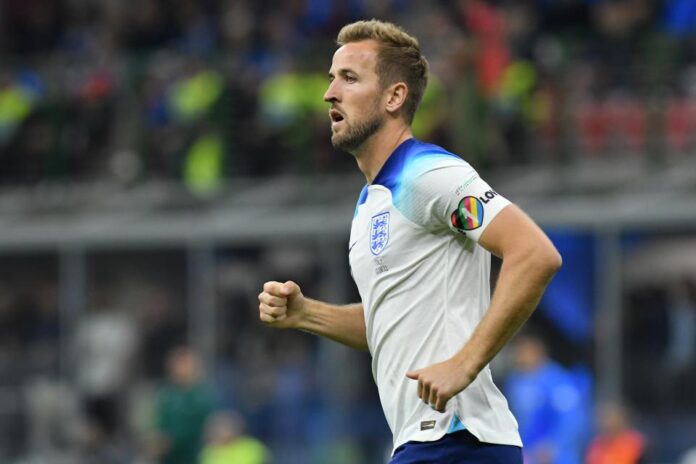The captains of eight countries at the 2022 World Cup in Qatar are weighing up the risk of incurring the wrath of FIFA by wearing a ‘OneLove’ armband in support of the LGBTQ+ community — after the world governing body did not officially sanction its use.
Ahead of England’s opening Group B clash with Iran, there is still speculation as to whether Three Lions captain Harry Kane will go ahead with his previously stated plan to join the captains of Belgium, Denmark, France, Germany, Switzerland, Wales and the Netherlands in wearing the armband at the World Cup.
The captains who choose to wear the OneLove armband reportedly risk being fined by FIFA or even shown a yellow card for doing so, but they have said repeatedly in the build-up to the tournament they are determined to take a stand against discrimination.
Meanwhile, Poland captain Robert Lewandowski has also said that he will wear a different socio-political armband for his side’s clash with Mexico on November 22 bearing the Ukrainian flag, which was given to him by former Ukraine captain and coach Andriy Shevchenko.
Here we breakdown the latest on the World Cup 2022 armband controversy.
MORE: Qatar’s 12-year World Cup plan undone in one half as they make unwanted history
What does the OneLove captain’s armband mean?
The OneLove campaign was started by the Dutch FA in 2020, with the aim of expressing a message of unity and to speak out against all forms of discrimination.
The Netherlands received support from nine other European teams that pledged to wear the OneLove armband in their international fixtures in 2022, including UEFA Nations League and FIFA World Cup matches.
The armband itself features a heart design containing a rainbow scheme, which the Dutch FA said is intended to represent “everyone’s pride of their heritage, race, gender identity and sexual orientation”. A white ‘1’ appears in the middle of the heart, with the words ‘one’ and ‘love’ written in black on either side of it.
Why World Cup captains are planning to wear the armband
The commitment from eight World Cup team captains to wear the OneLove armband in Qatar has particular significance, due to the country’s stance on same-sex relationships.
Even though FIFA have been slow to grant permission to wear the armbands, and reports suggest that those who choose to make such a statement risk being sanctioned by the governing body, Kane stated in the build-up to the finals that he and his fellow European captains are determined to do so as a show of solidarity and equality.
FIFA’s rules prohibit the making of political statements or gestures, with the game’s chiefs urging countries in the run up to Qatar 2022 to focus on matters on the pitch instead.
But Kane told a press conference ahead of Tottenham’s UEFA Champions League match against Eintracht Frankfurt in October England’s plan was to wear the armband: “We’ve decided we want to wear it and that’s our thought process going forward. It’ll be down to FIFA and the FA. I’m sure they’ll be in contact with them.
“I haven’t heard anything personally yet so at the moment we’re on line to wear it, so if anything changes we’ll cross that bridge when it comes.”
England manager Gareth Southgate explained that wearing the armband is part of England’s aim to raise awareness of human rights issues in Qatar, which include the rights of migrant workers.
He told a press conference in September: “We’ve done a lot of research, the FA have had countless meetings with NGOs, migrant workers in Qatar, they’ve gathered all the information and requests of people affected. There’s a limit to what can be achieved.
“Talking about the issues and raising the issues and putting them on the table is the vehicle that people involved in sport have used in the past, and it is what we’re trying to do this time.
“There will always be criticism, whatever you do, but we’re trying to affect the areas we’ve been asked to affect.”
More: Rules in Qatar for World Cup: Local laws and regulations on alcohol, sex for 2022 event
What has FIFA said about the armband?
As things stand, FIFA have not officially approved the armband to be worn, and so the threat of sanctions such as a yellow card, or possibly other penalties for the nations involved appears a real one.
Interestingly, though, FIFA have themselves chosen to use the tournament as a way to highlight certain social issues and, yes you guessed it, they will use an armband to do so!
FIFA met with the officials of the European teams that plan to wear the armband on November 19 in a bid to persuade them to wear their version but were unsuccessful.
“FIFA came up with their own armband idea just two days ago. That was not acceptable for us,” German football federation president Bernd Neuendorf told ZDF.
An armband row is brewing. With England and nine other European nations committed to wearing a ‘One Love’ armband, FIFA have announced their own armband supporting various social campaigns in each round. pic.twitter.com/WmHs4Hpdxi
— James Olley (@JamesOlley) November 19, 2022
Same-sex laws in Qatar explained
Since Qatar was named as the host nation of the 2022 FIFA World Cup, there has been widespread criticism of the decision due to the country’s track record on human rights and its laws in relation to LGBTQ+ issues that make same-sex sexual activity a criminal matter.
Homosexuality is illegal in Qatar, with punishments including jail sentences of up to seven years. Muslim men engaging in same-sex sexual activity can face the death penalty in Qatar’s Sharia courts, although there is no record of this having happened.
The group Human Rights Watch claimed in October 2022 that security forces in Qatar have arbitrarily arrested LGBT people and subjected them to ill-treatment in detention, as recently as September 2022.
Rasha Younes, an LGBT rights researcher at Human Rights Watch, said in a statement: “While Qatar prepares to host the World Cup, security forces are detaining and abusing LGBT people simply for who they are, apparently confident that security force abuses will go unreported and unchecked.
“Qatari authorities need to end impunity for violence against LGBT people. The world is watching.”
Nassar al-Khater, the chief executive of the 2022 FIFA World Cup in Qatar, insisted all fans would be welcome at the tournament, telling a press conference: “I would like to assure any fan, of any gender, (sexual) orientation, religion, race to rest assured that Qatar is one of the most safe countries in the world — and they’ll all be welcome here.”
He added: “The safety and security of every single fan is of the utmost importance to us. There’s a lot of training going into security personnel to make sure that things that are culturally different are seen in that frame.
“Public displays of affection [are] frowned upon — it’s not part of our culture — but that goes across the board to everybody.”
Hits: 0











